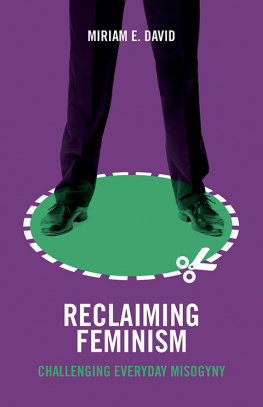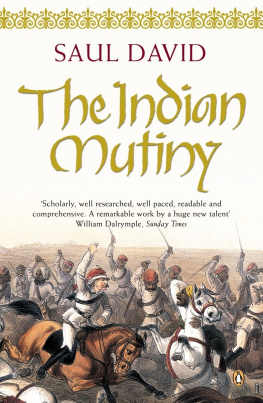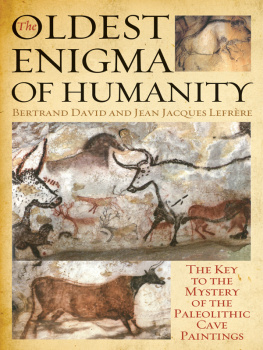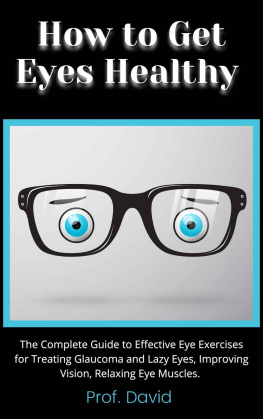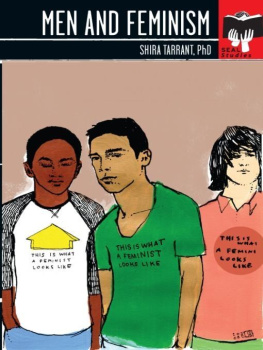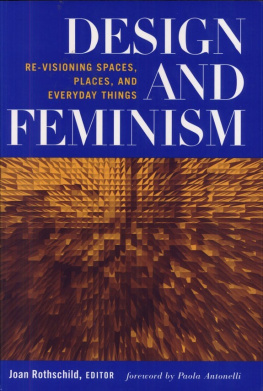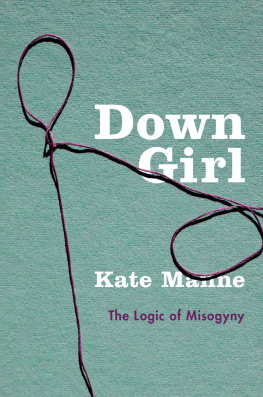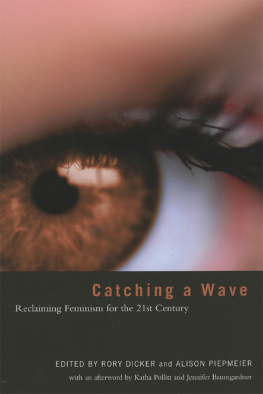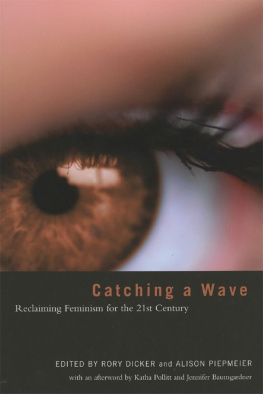David - Reclaiming feminism: challenging everyday misogyny
Here you can read online David - Reclaiming feminism: challenging everyday misogyny full text of the book (entire story) in english for free. Download pdf and epub, get meaning, cover and reviews about this ebook. City: Great Britain, year: 2016, publisher: Policy Press, genre: Politics. Description of the work, (preface) as well as reviews are available. Best literature library LitArk.com created for fans of good reading and offers a wide selection of genres:
Romance novel
Science fiction
Adventure
Detective
Science
History
Home and family
Prose
Art
Politics
Computer
Non-fiction
Religion
Business
Children
Humor
Choose a favorite category and find really read worthwhile books. Enjoy immersion in the world of imagination, feel the emotions of the characters or learn something new for yourself, make an fascinating discovery.
Reclaiming feminism: challenging everyday misogyny: summary, description and annotation
We offer to read an annotation, description, summary or preface (depends on what the author of the book "Reclaiming feminism: challenging everyday misogyny" wrote himself). If you haven't found the necessary information about the book — write in the comments, we will try to find it.
Reclaiming feminism: challenging everyday misogyny — read online for free the complete book (whole text) full work
Below is the text of the book, divided by pages. System saving the place of the last page read, allows you to conveniently read the book "Reclaiming feminism: challenging everyday misogyny" online for free, without having to search again every time where you left off. Put a bookmark, and you can go to the page where you finished reading at any time.
Font size:
Interval:
Bookmark:


To all my children and grandchildren and future generations in the hope that they will continue to strive for a more socially and sexually just world
First published in Great Britain in 2016 by
Policy Press University of Bristol 1-9 Old Park Hill Bristol BS2 8BB UK Tel +44 (0)117 954 5940 e-mail
North American office: Policy Press c/o The University of Chicago Press 1427 East 60th Street Chicago, IL 60637, USA t: +1 773 702 7700 f: +1 773-702-9756 e:
Miriam E. David 2016
British Library Cataloguing in Publication Data
A catalogue record for this book is available from the British Library.
Library of Congress Cataloging-in-Publication Data
A catalog record for this book has been requested.
ISBN 978 1 44732 817 9 paperback
ISBN 978 1 44732 819 3 ePub
ISBN 978 1 44732 820 9 Mobi
The right of Miriam E. David to be identified as author of this work has been asserted by her in accordance with the Copyright, Designs and Patents Act 1988.
All rights reserved: no part of this publication may be reproduced, stored in a retrieval system, or transmitted in any form or by any means, electronic, mechanical, photocopying, recording, or otherwise without the prior permission of Policy Press.
The statements and opinions contained within this publication are solely those of the author and not of the University of Bristol or Policy Press. The University of Bristol and Policy Press disclaim responsibility for any injury to persons or property resulting from any material published in this publication.
Policy Press works to counter discrimination on grounds of gender, race, disability, age and sexuality.
Cover design by Soapbox Design
Front cover: image kindly supplied by Shutterstock
Readers Guide
This book has been optimised for PDA.
Tables may have been presented to accommodate this devices limitations.
Image presentation is limited by this devices limitations.
Miriam David, known to family and close, older friends as Miki, has been a feminist and activist throughout her adult life. As an academic, she has worked in several universities and institutions of higher education in the UK, and on occasion, in North America. She is now professor emerita of sociology of education at University College London Institute of Education. She has a worldwide reputation for her research and scholarship on education, family, feminism, gender and social policy. She has published numerous papers and books, including most recently Feminism, gender and universities: Politics, passion and pedagogies (Ashgate, 2014). Together with colleagues in the USA, she is editing the Sage International Encyclopaedia of Higher Education to be published in 2018. She remains involved in campaigning for social and sexual justice, nowadays through the Feminist Forum - Seventies Sisters and as chair of the trustees of the Womens Therapy Centre in London.
Many friends and family have helped me with the preparation of this manuscript. I am immensely grateful for all your friendship and support. I hope that I have portrayed your insights, views and values appropriately. I am also very grateful to Alison Shaw of Policy Press for believing in me and bringing this book to fruition.
In particular, there are colleagues and friends with whom I have collaborated on various research and book projects. Many contributed to my recent studies of feminism and womens studies in academe, and to the European Union-funded project on challenging gender-related violence for children and young people.
I should particularly like to thank those women who talked to, or wrote to, me for these studies.
They include all my dear friends from the Bristol Womens Studies Group (BWSG) and others in and around Bristol at the time, namely Sandra Acker, Alison Assiter, Liz Bird, Avtar Brah, Sarah Braun, Claire Callender, Davina Cooper, Sara Delamont, Carol Dyhouse, Mary Fuller, Naomi Fulop, Jane Gaskell, Helen Haste, Maggie Humm, Tessa Joseph, Hilary Land, Ruth Levitas, Ellen Malos, Caroline New, Marilyn Porter, Teresa Rees, Sheila Riddell, Susie Skevington, Helen Taylor, Linda Ward, Jackie West, Fiona Williams, Lyn Yates.
I should also like to thank friends and colleagues in London and abroad from my numerous feminist international networks including Pam Alldred, Madeleine Arnot, Barbara Biglia, Jill Blackmore, Mimi Bloch, Penny-Jane Burke, Pam Calder, Kelly Coate, Fiona Cullen, Vaneeta DAndrea, Rosemary Deem, Rosalind Edwards, Debbie Epstein, Sharon Gewirtz, Dulcie Groves, Gigi Guizzo, Val Hey, Carolyn Jackson, Ileana Jimenez, Heather Joshi, Jane Kenway, Terri Kim, Annette Lawson, Gail Lewis, Ruth Lister, Wendy Luttrell, Frinde Maher, Jane Martin, Sue Middleton, Heidi Mirza, Louise Morley, Gemma Moss, Diane Reay, Emma Renold, Jessica Ringrose, Sasha Roseneil, Maxine Seller, Bev Skeggs, Corinne Squires, Mary Stiasny, Kathleen Weiler, Gaby Weiner, Lois Weis, Elizabeth Wilson, Nira Yuval-Davis.
More recently my U3A group on Women and Wisdom, my Knit and Natter sisters, and the London Seventies Sisters and Feminist Forum, including Gail Chester, Irena Fink, and Amanda Sebestyen, have been important sources of on-going support. Other more recent important feminist friendly colleagues include Melissa Benn, Leslie Gardner, Chloe Stallibrass and Gill Yudkin.
As I was putting the finishing touches to the manuscript I learnt of the appointment of another dear feminist friend - Becky Francis as my boss or Director of UCL IOE. This makes the future prospects for feminism in higher education much less gloomy.
Finally, I would like to thank my family for all the support and practical help you give me as well as the fun times we have: Jeff [Duckett] for thinking with me about our ageing, Charlotte [Reiner] and David [Hershman] for allowing me to share in the care of your delightful Jacob, and Toby [Reiner], Meg [Winchester] and Matt [Duckett] for supplying me with political critiques and nous from the US.

The author and publisher gratefully acknowledge permission to reproduce excerpts from the following publications: What should we tell our daughters? by Melissa Benn ( Melissa Benn, 2013; published by John Murray Press); and A Womens Liberation Movement woman by Judith Viorst ( Judith Viorst, 1970; published by A.M. Heath & Co Ltd).
It is important to note that the waves of feminism are not separate and necessarily different but may be distinctive in responding to the wider sociopolitical and economic contexts.
First wave (19th/early 20th centuries): struggles for womens suffrage
Second wave (1960s-80s): civil rights, womens rights and the era of social democracy
Third wave (1980s-90s): the era of diversity and globalising feminisms
Fourth/fifth wave (21st century): feminisms in a digital era with millennials, the selfie generation and the rise of everyday sexism
This book is a feminist memoir about political activism and scholarship over the last 50 years to enable us to reclaim feminism, given its resurgence in endangered neoliberal public spaces. Quite clearly, we women now have a place in politics, public life, in education, higher education, employment, and in personal family life, including in sexual and social relationships.
Just five decades ago, feminism was barely on the public agenda. Today, by contrast, we see feminism in countless media, public and political places, although as women, we are still treated as other and different from men, especially those in power. There has been an increase in patriarchy, sexism and misogyny in various media, particularly with the rise in social media the selfie generation within a sharply competitive global economy. So what have been the obstacles to and opportunities for change, which have led to the resurgence of feminism in the 21st century? In this book, I argue about the importance of feminism to womens lives, even if equality, respect, fairness and social justice for women remain a distant prospect. Despite the everyday misogyny experienced by women, we feel empowered by feminism.
Next pageFont size:
Interval:
Bookmark:
Similar books «Reclaiming feminism: challenging everyday misogyny»
Look at similar books to Reclaiming feminism: challenging everyday misogyny. We have selected literature similar in name and meaning in the hope of providing readers with more options to find new, interesting, not yet read works.
Discussion, reviews of the book Reclaiming feminism: challenging everyday misogyny and just readers' own opinions. Leave your comments, write what you think about the work, its meaning or the main characters. Specify what exactly you liked and what you didn't like, and why you think so.

